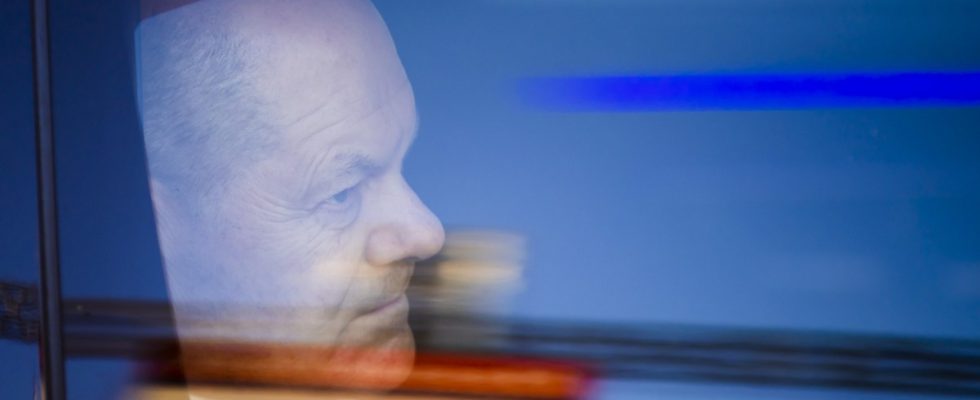After the heavy defeat for the traffic light coalition before the Federal Constitutional Court, the controversial heating law should continue to come. The Bundestag will only decide after the summer break. The parliamentary group leaders of the SPD, Greens and FDP agreed on this.
Less than 48 hours before the parliamentary decision that was actually planned for this Friday, the Federal Constitutional Court had stopped the project in an urgent procedure. The highest German court in Karlsruhe ruled that the second and third readings in the Bundestag should not take place during the current session week. It raised doubts as to whether the rights of the deputies were sufficiently protected during the deliberations, since they had not been given enough time to read the law, which had been fundamentally amended several times.
“We have respect for the decision of the Federal Constitutional Court,” said the parliamentary group leaders Rolf Mützenich (SPD), Katharina Dröge and Britta Haßelmann (Greens) and Christian Dürr (FDP) in writing, but decided not to make a public appearance together. In the deliberations, there were again arguments, especially between the Greens and the FDP. The Greens wanted the law to be passed at a special session in the summer, but the FDP was against it.
Bundestag Vice-President Wolfgang Kubicki (FDP) emphasized that there was no urgency, since the law should not take effect until January 2024 anyway. In addition, a special session causes high costs and a high CO₂ load when 736 MPs are brought back from vacation and have to travel to Berlin. The Greens fear that the law could be unraveled again, but it was jointly confirmed that it should remain in its current form. The final deliberations and the vote are now to take place in the next regular session week at the beginning of September.
Federal Minister of Economics Robert Habeck says that is a good approach
The CDU MP Thomas Heilmann had applied for a temporary injunction against the decision in the Bundestag because the draft law had not been submitted to the MPs in writing 14 days beforehand. “The traffic light is ruining the heat transition with a last-minute legislative package and an unconstitutional process,” Heilmann said on Thursday. Due to the shortened deliberations on the amendment to the law, conceptual weaknesses in the law could neither be shown nor changed.
Chancellor Olaf Scholz (SPD) was surprised by the decision on Wednesday evening at a summer party of the SPD parliamentary group; before that he had shown himself confident that the issue was settled. Scholz himself had insisted on a decision before the summer break. Federal Minister of Economics Robert Habeck (Greens) said: “I think that’s a good approach.” It takes the Constitutional Court into account and maintains clarity for citizens.
In essence, the Building Energy Act (GEG) stipulates that in future only heating systems that can be operated with at least 65 percent renewable energies may be installed. Where there is still no clarity about municipal heat planning, a transitional period until 2028 will be granted. After a first draft was made public early on, the traffic light groups changed the law fundamentally. The obligation to install heat pumps in particular has been significantly eased, and hydrogen-capable gas heaters should also remain permitted. In addition, there should be generous funding of up to a maximum of 21,000 euros.
Accelerated procedures must remain the exception, demands Bundestag President Bärbel Bas
Government spokesman Steffen Hebestreit emphasized that the Chancellor considered it “a very sensible decision” to pass the law in the next regular week of meetings in September. With regard to the decision from Karlsruhe, Bundestag President Bärbel Bas (SPD) emphasized: “In all future legislative processes, everyone involved must have sufficient time for their deliberations – especially the members of parliament and the experts.” Accelerated procedures must remain the exception.
In the summer break, however, the traffic light could now be the subject of new debates on the law, and the topic could also play a role in the election campaigns for the state elections in Hesse and Bavaria in autumn. CSU leader Markus Söder and CDU leader Friedrich Merz are calling for the reform, which affects millions of citizens, to be examined.
Union faction leader Merz criticized that dealing with parliament and especially the opposition was unacceptable. It is good that the Federal Constitutional Court has now made this clear. In three quarters of the legislative procedures, there are now requests for the coalition to shorten the deadline. At the same time he offered the SPD, Greens and FDP talks: There is every reason to now discuss the content of the law properly and without time pressure and perhaps even to gear it to the goal of getting a broad parliamentary majority for such a deep intervention in private households. However, the coalition has agreed to introduce the law in the form already approved by the parliamentary groups for the second and final third reading.

